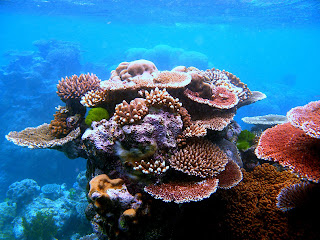The most iconic reef of them all must be the Great Barrier Reef. This incredible structure is 2,300km long and sites off of the east coast of Australia, and has been a World Heritage Site since 1981. Australian law dictates that the managing Park must submit a report on its condition every 5 years. This year has seen its status officially downgraded from 'poor' to 'very poor' as a result of climate change.
Human aided global warming has caused sea temperatures to rise, putting stress on the reef, and now UNESCO are considering adding it to their 'in danger' list of sites.
- The 2009 report found the Barrier Reef at a "crossroads between a positive, well-managed future and a less certain one."
- By 2014 it was being seen as an "icon under pressure."
- The 2019 edition is even less rosy, saying that the Barrier Reef is, "changed and less resilient."

Flynn Reef, Great Barrier - quite likely to have been hard hit in the bleaching events of 2016-17
(photo: commons.wikimedia)
Mass bleaching events in 2016 and 2017 really took their toll - in fact estimates show that between 30 and 50% of all coral was lost in those two years! The current report states clearly that, "the window of opportunity to improve the Reef's long-term future is now." It found that new coral populations had crashed by 89% along a 1,500km stretch (around two-thirds) from the effects of these bleaching events.
Despite Australia pledging A$500m to help with protection measures for the reef in 2018, Imogen Zethoven, Director of Strategy at the Australian Marine Conservation Society, says that more is needed from the country's leaders - "saving it means being a leader here and internationally to bring greenhouse (GHG) emissions down."
What is coral bleaching?
Bleaching occurs when sea temperatures rise, causing coral polyps to expel the vital symbiotic algae living in its tissues. When this algae is gone, the tissues start to die and the vibrant colours disappear, and get so brittle that bits break off from the coral skeleton. This can be so severe that scientists refer to this as 'Ghost Coral', because there is almost nothing left of it.
 |
| Bleached coral (photo: theconservation.com) |
Situation globally:
A report released in Science Magazine in January 2018 (T.P. Hughes et al), reflected on studies of 100 coral reefs globally, between 1980 and 2016.
They discovered that these bleaching events had only occurred once every 25-30 years up to the early 1980's, but by now could be expected, on average, once every 6 years. And more than that, bleaching events used to only be a very local scale, measured in tens of kilometre's, and generally caused by local stress factors like sedimentation. They could then see these regional scale bleaching events occur in the growth bands of old coral - they particularly noted the Mesoamerican reef in the Caribbean, which developed stress bands along a 400km stretch after some particularly hot conditions.
Coral and climate change:
Recent studies have shown that after a heat event, big sea temperature rises are decaying reefs at a much quicker rate than previously thought. These events can weaken the coral by up to 15%, which as previously mentioned starts to make them brittle and fragments fall off.
Dr Mark Eakin at the US National Oceanic and Atmospheric Administration (NOAA) told BBC News in 2018, "The acceleration in the return rate of bleaching events matches up very well with what the climate models have been telling us. They predict that by mid-century most of the world's coral reefs will be suffering from yearly, or near-yearly heat stress."
It is also worth noting that the 'cold' phases of the La Nina - El Nino cycle, are now actually warmer than the 'hot' phases were just three decades ago! So overall, cool water almost doesn't exist any more - just variations of warm and warmer.
Other threats to coral:
- Pollution from sewage and improperly treated wastewater adds additional nutrients, chemicals and bacteria to the ocean, which greatly upsets the delicate balance of coral reefs.
- Habitat destruction can come from marine debris from boats and trawlers, from mining coral for roadfill, taking prettier corals to sell to tourists, and blast fishing that is practised in some areas.
- Over-fishing affects as much as 55% of the world's reefs (Coral.org), and unchecked will remove the herbivorous species like Parrotfish and Surgeonfish that feed on the reefs. Without them, macroalgae can thrive and end up smothering reef sections.
Indirect impacts of reef destruction:
Reefs offer a great deal of coastal protection from big waves, storms and flooding. They provide the spawning and nursery grounds for a number of economically important fish stocks.
And while, tourism can cause damage to reefs (poor diving techniques, removing coral for sale etc.) - it provides a huge boon to many parts of the world. Reefs generate $billions in revenue and sustain hundreds and thousands of jobs in over one hundred countries. A 2002 estimate showed that reefs had a value of $10bn globally, with $360m a year in direct economic benefits.
As an example, the small Caribbean island of Bonaire can generate around $23m a year in revenue from tourism around its reefs, but it only costs them around $1m to manage the Park the reefs lie in.
So, the future looks fairly bleak for our coral reefs. Such an incredibly beautiful and vitally important part of our planet, which anyone of can summon up an image of even if we have never been to one, could be all but wiped from the seafloors by 2050 or so. Even if we keep global warming to around 1.5 to 2°C by then, in line with the Paris Agreement, 75% or more could be gone. Leave global warming relatively unchecked to rise up to 3, 4°C or more - they could be gone forever.
Research:
https://www.bbc.co.uk/news/world-australia-49520949
https://www.bbc.co.uk/news/science-environment-49255642
https://www.bbc.co.uk/news/science-environment-42571484
https://science.sciencemag.org/content/359/6371/80
https://coral.org/coral-reefs-101/reef-threats/
https://coral.org/adapt/
https://coral.org/coral-reefs-101/reef-threats/direct/
https://coral.org/coral-reefs-101/why-care-about-reefs/tourism/
No comments:
Post a Comment